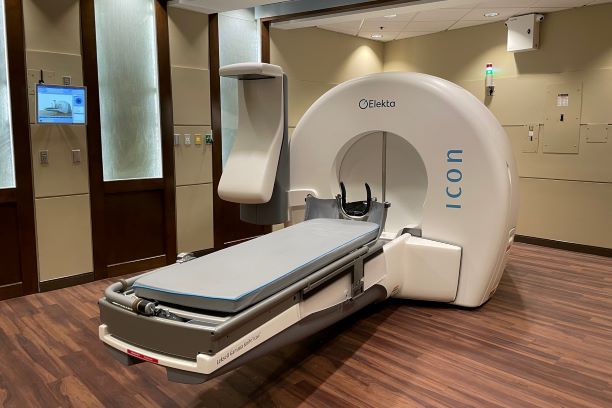
There are many types of brain tumors – those arising in the brain itself (primary brain tumors) and those that metastasize from other parts of the body to the brain (secondary or metastatic brain tumors). An estimated 88,000 new cases of primary brain and spinal cord tumors were diagnosed in the US in 2021.1 Additionally, approximately 70,000-170,000 patients are diagnosed with a secondary brain tumor annually.2 Depending on the type of tumor, treatment may include surgery, chemotherapy and/or radiation.
When radiation is prescribed, the type of radiation therapy recommended depends on the type of tumor, and for a specific group of tumors (outlined below) stereotactic radiosurgery may be the best option.
Stereotactic radiosurgery and Gamma Knife®
Stereotactic radiation/radiosurgery (SRS) is a type of highly focused radiation that is usually delivered with 1-5 treatments at higher doses than conventional radiation, and usually with greater precision.
The Leksell Gamma Knife® is an SRS system designed specifically for intracranial radiosurgery. Despite its name, the system is not a blade that cuts. Rather, it is a highly advanced, safe, non-invasive device that uses radiation to damage targeted tissue in a very precise manner.
During a treatment procedure, up to 192 radiation beams are precisely directed to one target (tumor) at a time. The shape and dose of the radiation is designed to focus on the exact point desired, with minimal damage to nearby healthy tissue and critical structures.
The treatment can be considered for patients with:
- Malignant tumors (brain metastases, recurrent glioblastomas).
- Benign tumors (meningiomas, vestibular schwannomas, pituitary adenomas, vascular malformations).
- Functional disorders (trigeminal neuralgia/atypical facial pain, tremors).
Research has shown Gamma Knife radiosurgery to be a safe and effective treatment tool with successful long-term outcomes for certain brain tumors.3
Depending on a patient’s diagnosis, the targeted radiation may destroy or stop the growth of tumors by damaging cell DNA, change function, as in the case of hormone-producing tumors in the pituitary gland or pain sensations in the trigeminal nerve, or generate changes in blood vessels in the brain (arteriovenous malformations).
Treatments can be performed with the use of a head frame or a thermoplastic mask, depending on the type, size, and location of the tumor.
For many patients, Gamma Knife can be delivered in a single session. Other patients may be offered fractionated stereotactic radiosurgery, which divides the total radiation dose over several treatment sessions. Fractionation extends the treatment’s precision and accuracy to large lesions or those close to very sensitive areas.
With the precision and targeted nature of stereotactic radiosurgery, we are able to offer a treatment that reduces side effects of radiation treatment. Specifically, radiosurgery can reduce cognitive decline, which is one of the most common concerns patients have about treatment to the brain.
References:
- Ostrom Q, Cioffi G, Waite K, Kruchko C, Barnholtz-Sloan J. CBTRUS Statistical Report: Primary Brain and Other Central Nervous System Tumors Diagnosed in the United States in 2014–2018. Neuro Oncol. 2021 Oct 5;23(12 Suppl 2):iii1-iii105, https://doi.org/10.1093/neuonc/noab200.
- “Quick Brain Tumor Facts,” National Brain Tumor Society, accessed May 16, 2022, https://braintumor.org/brain-tumor-information/brain-tumor-facts/.
- Jang C, Jung H, et al. Long-Term Results of Gamma Knife Radiosurgery for Intracranial Meningioma. Brain Tumor Res Treat. 2015 Oct; 3(2): 103–107, https://dx.doi.org/10.14791%2Fbtrt.2015.3.2.10

